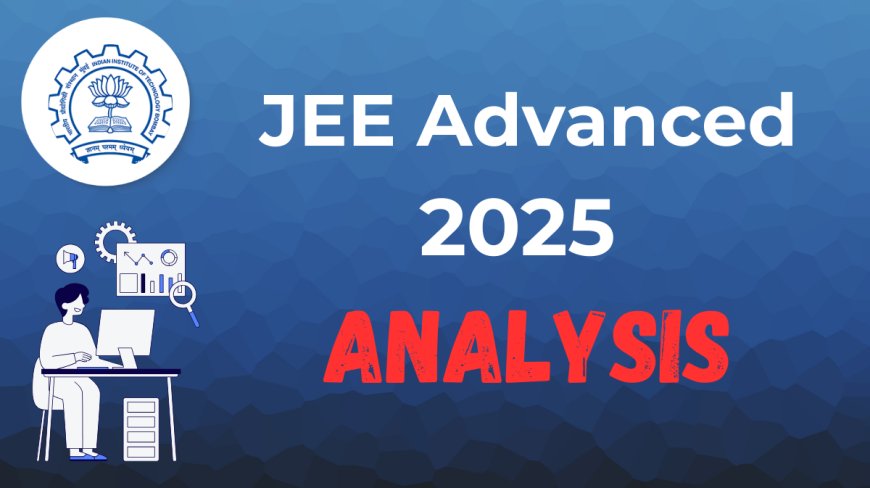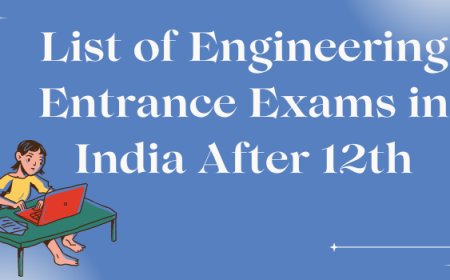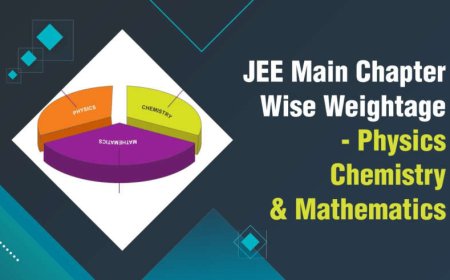JEE Advanced 2025 Analysis – Compare with Previous Years
Detailed JEE Advanced 2025 analysis with subject-wise review and comparison of difficulty levels and trends from previous years (2021–2024).

JEE Advanced 2025 analysis: The Joint Entrance Examination (JEE) Advanced 2025, conducted by IIT Kanpur, is a pivotal assessment for aspiring engineers to secure admission to India's prestigious IITs. This year's exam stayed true to its reputation for being tough, giving students a challenging but fair test of their knowledge and skills. Students must solve the previous year's question paper to crack the exam. The Joint Entrance Examination (JEE) Advanced 2025, conducted by IIT Kanpur, is a crucial assessment for aspiring engineers to secure admission to India's prestigious IITs. The JEE Advanced examination took place on Sunday, May 18, 2025, in two shifts:
- PAPER 1: 9:00 AM to 12 PM
- PAPER 2: 2:30 pm to 5:30 PM
Both papers were held in a computer-based test (CBT) mode, comprising 51 questions each, distributed equally among physics, chemistry, and mathematics. Each subject was further divided into four sections: Section I (12 marks), Section II (12 marks), Section III (24 marks), and Section IV (12 marks), totaling 180 marks per paper.
Read More: jee advanced 2025 last month preparation tips
JEE Advanced 2025 Analysis
Up to now, JEE Advanced 2025 hasn’t taken place yet, and the official analysis will be available next after the exam is conducted. Nevertheless, after conducting the exam, the paper analysis will be based on different groupings, including
Difficulty Level: General level of difficulty of the paper, which includes such subsections as physics, chemistry, and mathematics.
Subject-wise Analysis: Which subject was taken with ease, the most difficult to handle, or overall attention?
Question Format: Whether there were some changes in the pattern of the questions (single choice, multiple choice, numerical-based, or comprehension-based questions).
Overall Trends: How it was compared with the past years in terms of distribution of questions, topics discussed, and complexity.
You can expect insightful feedback from experts and coaching institutes as well post the exams. If you will, I can give you a kind of general overview of trends you will be able to see in previous years to prepare!
Previous Year Analysis of the JEE Advanced 2024 Exam
The Joint Entrance Examination (JEE) Advanced 2024, conducted by IIT Madras, was held on May 26, 2024. The examination was divided into two papers: Both papers were conducted in a computer-based test (CBT) mode, comprising 51 questions each, distributed equally among physics, chemistry, and mathematics.
Paper 1: Physics Paper
Difficulty level: Moderate to difficult
The physics section encompassed a broad spectrum of topics, including kinematics, rotational motion, kinetic theory of gases, modern physics, capacitors, current electricity, optics, electrostatics, and electromagnetic induction.
Student Feedback: Many students found the physics section to be more demanding compared to chemistry and mathematics. The questions tested not only theoretical knowledge but also the application of concepts in novel situations. The organic chemistry segment was direct, focusing on named reactions and mechanisms. Questions on biomolecules and polymers were prevalent, testing students' ability to recall and apply specific reactions.
Read More: JEE Advanced 2025: Category-wise Marks vs Rank & Previous Year Trends
Paper 1: Chemistry - Balanced with Weight on Organic Chemistry
Difficulty level: Moderate
Organic Chemistry: The organic chemistry segment was direct, focusing on named reactions and mechanisms. Questions on biomolecules and polymers were prevalent, testing students' ability to recall and apply specific reactions.
Physical Chemistry: Topics such as chemical kinetics, thermodynamics, and electrochemistry were well represented. The questions were designed to assess both conceptual understanding and problem-solving skills.
Inorganic Chemistry: Questions were primarily based on NCERT guidelines, with a few challenging ones on Coordination Compounds and Transition Elements.
Student Feedback: Overall, students found the chemistry paper balanced, with organic chemistry being slightly more time-consuming due to the need for detailed mechanisms.
Paper 1: Mathematics—Challenging with Lengthy Problems
Difficulty Level: Moderate to Difficult
Topics Covered: The mathematics section included questions from calculus (differentiation, integration), algebra (matrices, complex numbers), coordinate geometry (3D geometry, conic sections), and probability.
Question Format: The questions were lengthy and required multi-step solutions, testing students' analytical and time-management skills.
Student Feedback: Many candidates reported that the mathematics paper was challenging, with questions that required a deep understanding of concepts and the ability to apply them in complex scenarios.
Paper 2: Physics—Tougher than Paper 1
Difficulty Level: Difficult
Topics Covered: The physics section included questions from waves and sound, ray and wave optics, fluids, EM waves, thermodynamics, modern physics, kinematics, gravitation, and electrostatics.
Student Feedback: Students found the physics section in Paper 2 to be tougher than in Paper1. The questions were tricky and involved lengthy calculations. Modern Physics had more weightage, and questions from Kinematics and Electromagnetism were more complex.
Paper 2: Chemistry—Tricky with Balanced Weightage
Difficulty Level: Moderate
Organic Chemistry: Questions focused on aldehydes and ketones, polymers, biomolecules, and mixed-concept questions.
Chemistry—Tricky with Balanced Weightage
Difficulty Level: Moderate
Organic Chemistry: Questions focused on aldehydes and ketones, polymers, biomolecules, and mixed-concept questions. Qualitative analysis appeared in comprehension-based questions.
Inorganic Chemistry: Questions on p-block elements, chemical bonding, and coordination compounds were directly from the NCERT textbook.
Physical Chemistry: Topics such as electrochemistry, ionic and chemical equilibrium, and surface chemistry were well represented.
Student Feedback: Overall, students found the chemistry section in Paper 2 tricky, with equal weightage given to organic, inorganic, and physical chemistry.
Read More: Toughest Shifts of JEE Main 2025 Session 2: Day-wise & Subject-wise
Paper 2: Mathematics—Challenging with Lengthy Problems
Difficulty Level: Challenging
Topics Covered: The mathematics section included questions from functions, limits, application of derivatives, definite integrals, area under the curve, inverse trigonometric functions, vectors, 3D geometry, circles, parabolas, quadratic equations, permutations and combinations, and probability.
Student Feedback: Students found the mathematics section in Paper 2 to be the toughest. The questions were lengthy and required multi-step solutions, testing students' analytical and time-management skills.
JEE Advanced paper analysis from 2023 to 2021
From 2013 to 2020, JEE Advanced maintained a consistently high level of difficulty, with each year testing deep conceptual understanding and problem-solving skills. Mathematics was the most challenging subject in most years, while chemistry tended to be more balanced and NCERT-based. The 2022 exam, conducted by IIT Bombay, stood out as the most difficult overall due to its complex and application-heavy questions.
JEE Advanced 2023
Conducted by: IIT Guwahati
Date: June 4, 2023
Paper Analysis:
Paper 1: Considered relatively easier, especially chemistry.
Paper 2: Significantly more difficult—math and physics were time-consuming and conceptually deep.
Subject-wise Difficulty:
Physics: Moderate in Paper 1, Difficult in Paper 2 (optics and mechanics heavy)
Chemistry: Easiest section (especially Physical and Inorganic)
Math: Tough due to lengthy and multi-step problems
Overall Difficulty: Moderate to Difficult
JEE Advanced 2022
Conducted by: IIT Bombay
Date: August 28, 2022
Paper Analysis:
Paper 1: Balanced, but questions were designed to be tricky with hidden traps in options.
Paper 2: More analytical, especially physics and math, requiring deep conceptual clarity.
Subject-wise Difficulty:
Physics: Toughest in Paper 2 (especially Mechanics and Thermodynamics)
Chemistry: Moderate, though Organic Chemistry was tricky
Math: Difficult; many students struggled with time
Overall Difficulty: Moderate to Difficult
Students widely noted the jump in difficulty from Paper 1 to Paper 2.
JEE Advanced 2021
Conducted by: IIT Kharagpur
Date: October 3, 2021
Paper Analysis:
Paper 1: Balanced but involved multiple-correct-type questions, which increased complexity.
Paper 2: More difficult than Paper 1, especially in math.
Subject-wise Difficulty:
Physics: Moderate (some tricky conceptual questions)
Chemistry: Balanced, NCERT-aligned.
Maths: Most difficult, involved lengthy calculations and abstract reasoning
Overall Difficulty: Moderate to Difficult
Math stood out as the toughest section across both papers.
Overall Difficulty level from 2024 to 2021
|
Year |
Conducting IIT |
Difficulty Level |
Toughest Subject |
|
2024 |
IIT Madras |
Moderate to difficult |
Physics |
|
2023 |
IIT Guwahati |
Moderate to Difficult |
Mathematics |
|
2022 |
IIT Bombay |
Difficult |
Physics |
|
2021 |
IIT Kharagpur |
Moderate to Difficult |
Mathematics |
Read More: JEE Advanced Cutoff 2025: Category-wise , Minimum Marks, Previous Year Trends
Which year had the easiest JEE Advanced paper?
While the difficulty of JEE Advanced papers is subjective and varies among candidates, some students found the 2014 paper to be relatively easier compared to other years. This perception was due to a more straightforward question pattern and less time-consuming problems.
Which year had the hardest JEE Advanced paper?
The 2016 JEE Advanced paper is often cited as the most challenging. Experts and students alike found the paper to be exceptionally tough, with complex questions that tested the depth of understanding and problem-solving abilities. The difficulty was reflected in the lower success rate and the high number of students finding the paper overwhelming.
Conclusion
JEE Advanced 2025 upheld its reputation as a rigorous assessment, challenging candidates across all subjects. The examination not only tested students' knowledge but also their ability to apply concepts in novel situations. As the trends suggest, the difficulty level of JEE Advanced varies each year, and while some years may be perceived as easier or harder, the key to success remains consistent: a deep understanding of concepts, regular practice, and effective time management. For future aspirants, analyzing past papers, understanding the evolving patterns, and focusing on conceptual clarity will be crucial in navigating the challenges of JEE Advanced.
What's Your Reaction?































